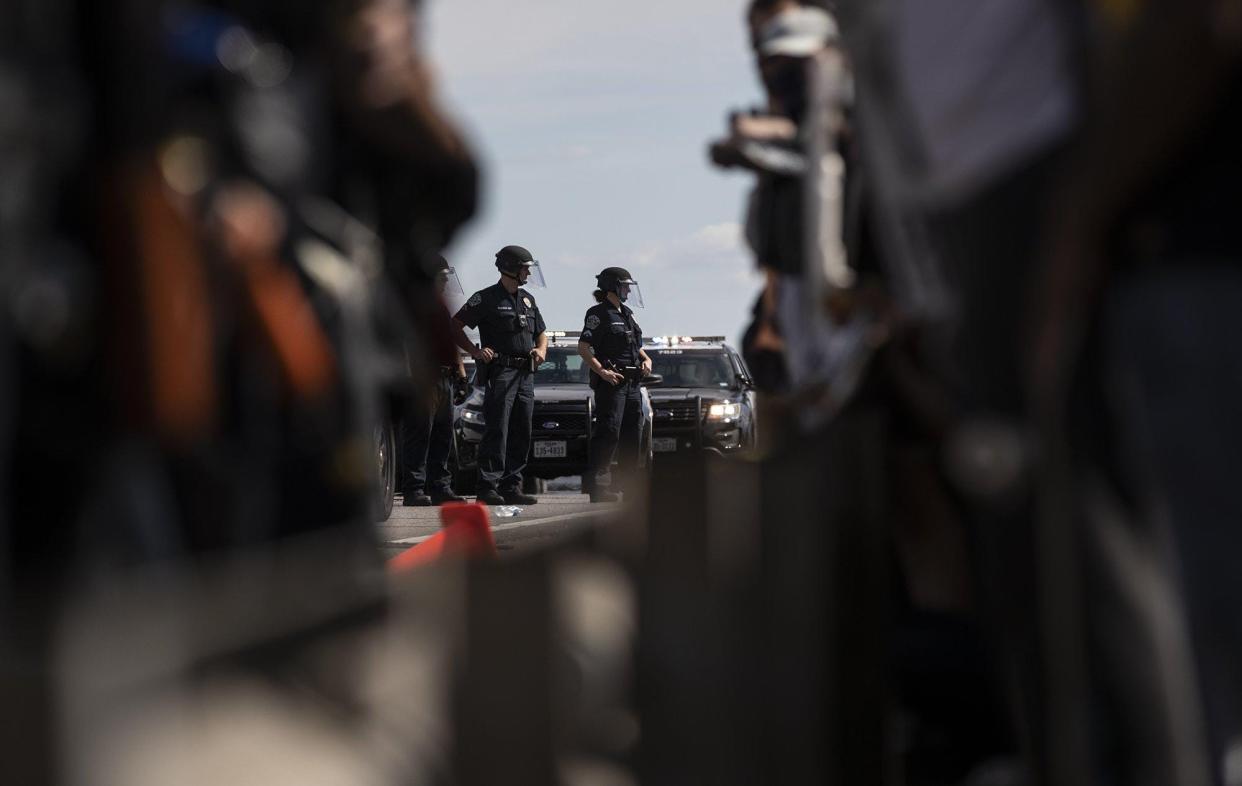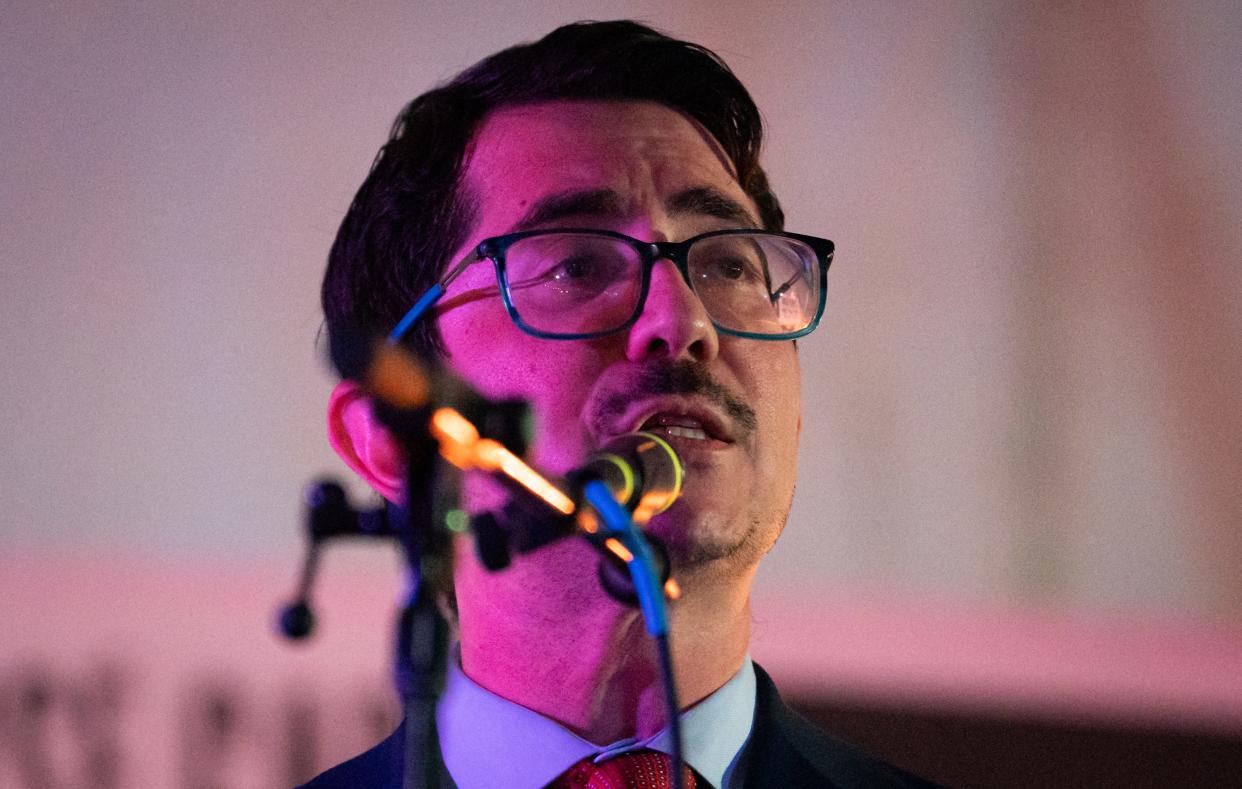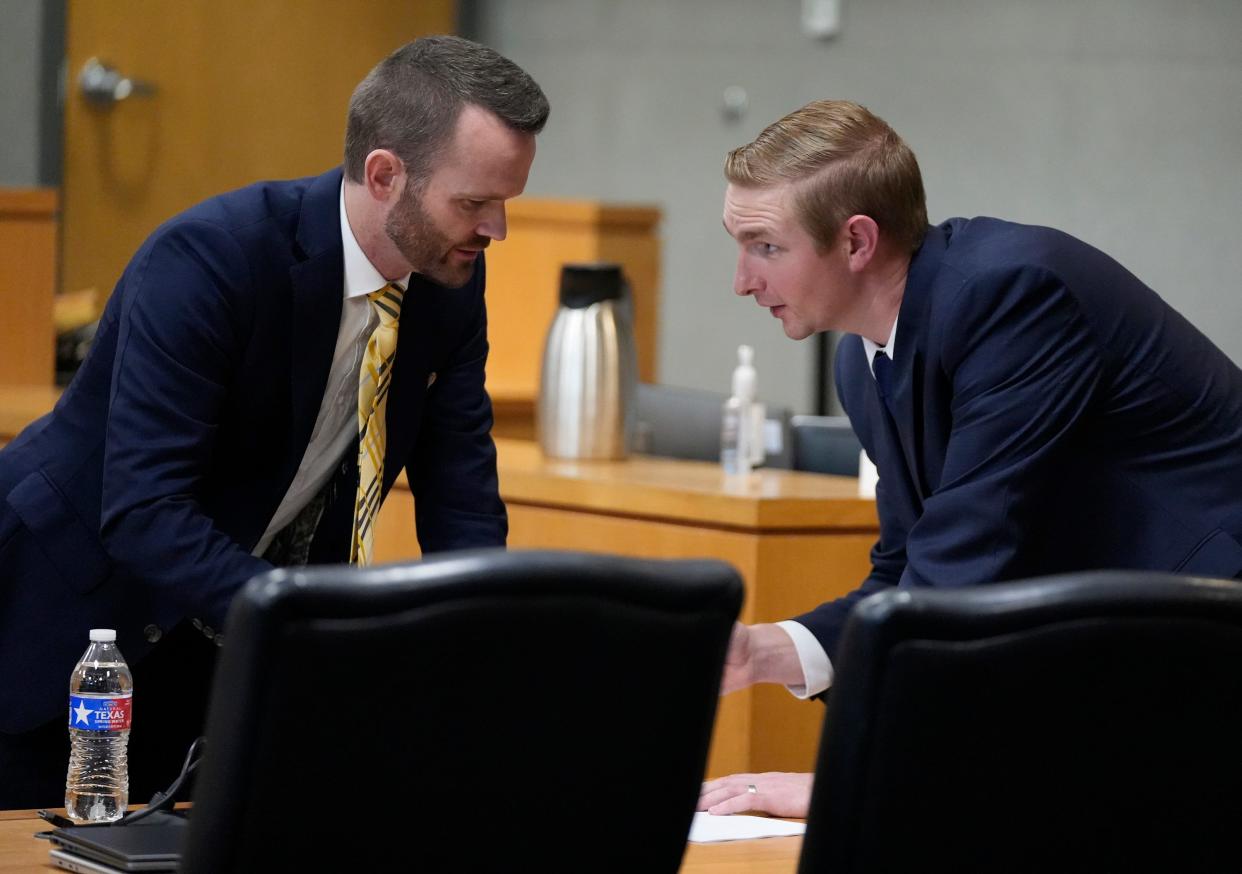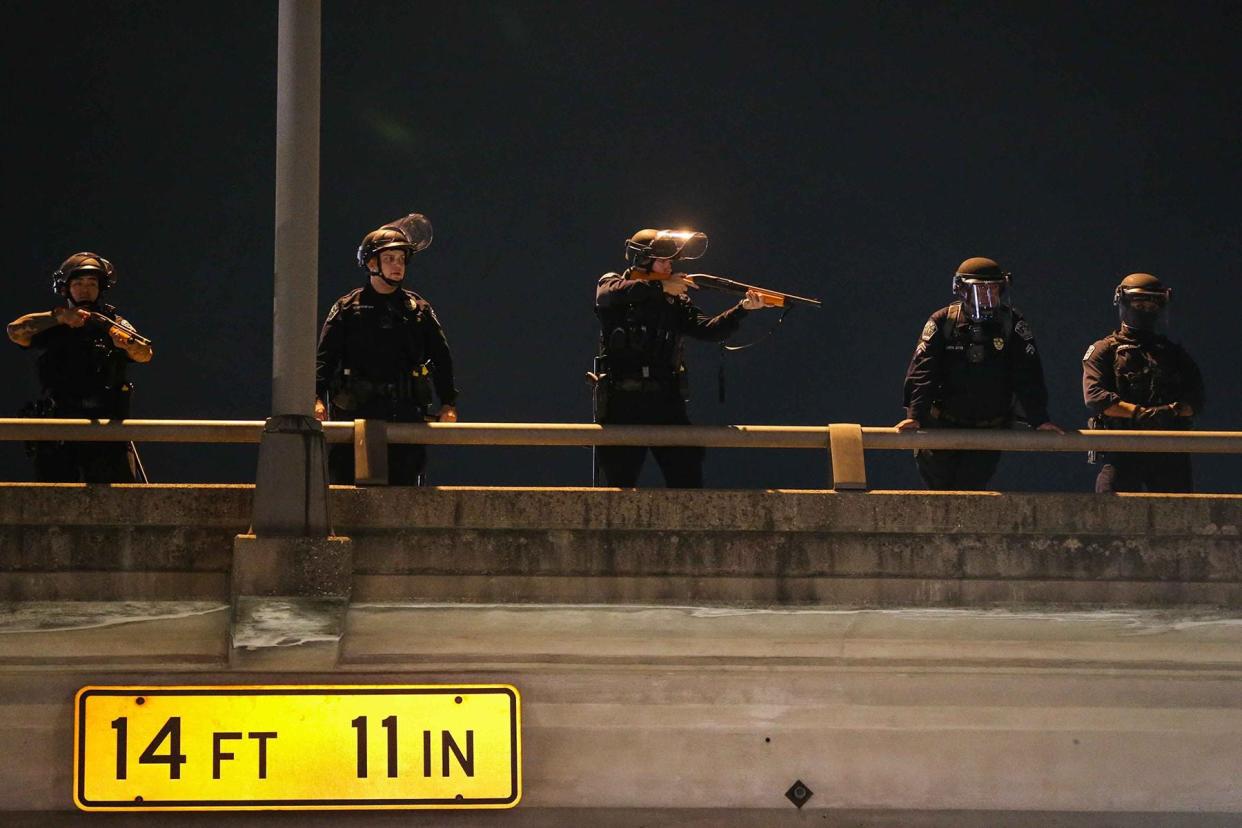Travis County DA José Garza promised police accountability. Has he delivered?
In 2020, after social justice protests made police reform a topic of national conversation, José Garza, then a candidate for Travis County district attorney, pledged to prioritize police misconduct cases.
He cruised to an easy victory against incumbent Margaret Moore.
Since entering office, Garza has presented 98 cases against law enforcement officers to a grand jury, 32 of which resulted in an indictment. By contrast, only five officers were indicted during Moore’s single term.
But three years after taking office, Garza has been unable to secure convictions in the three use-of-force cases his office has brought to trial. Earlier this month, a jury found former Williamson County sheriff’s Deputies Zachary Camden and James Johnson not guilty of manslaughter for their role in the death of Javier Ambler II. The verdict came just two days after Garza handily won the Democratic primary for district attorney, all but confirming his reelection this November.
It was the third use-of-force trial under Garza to end without a conviction. In October 2022, a jury found former Austin police officer Nathaniel Stallings not guilty of misdemeanor charges from a 2017 arrest. Last November, a jury was unable to reach a unanimous verdict in the murder case against Austin police officer Christopher Taylor, who shot and killed Michael Ramos in 2020.
Additionally, Garza recently dismissed 17 of 21 cases brought against Austin police officers for their use of “less-lethal shotguns” during the 2020 racial justice protests and requested a U.S. Justice Department inquiry. The indictments had signaled, early in his first term, Garza’s intention to aggressively pursue cases against police.
His office’s track record has called into question the civil rights unit’s ability to win cases against police officers and whether, with no convictions and a slew of dismissals, Garza has been able to hold police accountable for misconduct.
Ken Ervin, who has represented a series of law enforcement defendants, said that Garza's prosecution of police has been in pursuit of a political agenda and, if unchanged, would lead to more acquittals.
"This is politics over the proper application of the law," Ervin said.
Garza said his office will continue to present all police lethal force cases to grand juries and to prosecute cases in which an indictment was returned.
“We are committed to continuing to ensure that there is public oversight of excessive force cases,” Garza said.

Is a lack of expertise impacting the DA's ability to get convictions?
The most recent test for Garza and his team came during the two-week trial in Javier Ambler II’s death.
The 2019 case received widespread public attention after the American-Statesman revealed the details of Ambler’s death. While TV show "Live PD" crew members filmed, Camden and Johnson pursued Ambler after he failed to dim his headlights. Then, the deputies used Tasers on him multiple times while trying to take him into custody — as Ambler shouted that he had congestive heart failure and could not breathe.
To some observers, the acquittal of Camden and Johnson was less a reflection of the facts of the case and more an indication that the civil rights unit, which handles cases against officers, lacks crucial expertise.
Holly Taylor, associate director of the civil rights unit (and no relation to Christopher Taylor), presented much of the state’s case in the Ambler trial. Primarily an appellate lawyer who argues motions before a judge, Holly Taylor hadn’t presented a case to a jury in several years. The unit’s director, Dexter Gilford, had led the prosecutions of officers Nathaniel Stallings and Christopher Taylor. For most of the Ambler trial — with the exception of the closing arguments — Gilford took a backseat, citing personal matters.
The Ambler trial was also rife with evidence issues: Prosecutors initially agreed that one report hadn’t been sent to the defense, but they later realized it had been previously disclosed.
Javier Ambler, who shares a name with his late son, told the Statesman that he wasn’t surprised by the verdict. He said it wasn’t due to the evidence but rather to the team’s performance.
“They could be better organized. Sometimes you can see the energy, and other times …” Javier Ambler said, trailing off.
Given the difficulty of these cases, Scott Hendler, who has represented families of people injured by police in civil lawsuits, said the office should recruit lawyers “with the higher skill level necessary to prosecute police officers.”
"If they want to get different outcomes, they are going to have to reevaluate their approach," Hendler told the Statesman.
Gary Cobb, a former assistant district attorney known for his skill at trial, was hired as a special prosecutor for the case against Christopher Taylor for the death of Michael Ramos. Hendler said prosecutors might have fared better if Cobb “had been given complete control to prosecute the case himself.” Cobb is set to return to the retrial this fall.
Nationally, police prosecutions are rare and there are few lawyers with experience trying officers, though the district attorney’s office has made efforts to hire some. An email from Garza’s top deputy, Trudy Strassburger, recruiting lawyers “looking to prosecute police officers,” was leaked in 2021 and led to criticism from law enforcement officials.
Garza defended the performance of the civil rights unit in an interview with the Statesman, saying, “I am proud of the job that our attorneys have done.”
Police misconduct cases are uniquely difficult
Cases against law enforcement officers for on-duty conduct are particularly challenging to bring to trial, according to Kristy Parker, a former federal prosecutor who specialized in police excessive force cases. Parker said state law and the public tend to give officers the benefit of the doubt in use-of-force cases — though general attitudes might be shifting.
“The law and society typically have given police officers quite a bit of latitude to make what’s called split-second judgments about how to handle particular situations — particularly if they involve someone who the police officer perceives as posing some sort of threat,” Parker said.
In an interview with the Statesman, Garza said that his office had faced particular institutional hurdles when prosecuting police. One is that in-custody deaths are investigated by the Austin Police Department's Special Investigations Unit. Throughout the trial in the Michael Ramos case, prosecutors argued that police defendants are treated differently by investigators and called into question the willingness of Special Investigations Unit detectives to condemn the conduct of other officers.

“It is not uncommon for the evidence in our possession to say one thing, and then for the officers on the stand to say something different,” Garza said.
Parker echoed the possibility that police officers would refuse to cooperate with investigations into their colleagues, characterizing it as “what has historically been a police culture of silence … in order to protect each other from accountability.”
Garza cited another roadblock: The district attorney’s office has been unable to access Austin police officers’ confidential personnel records — known as “G files.” In the Ramos case, a city of Austin lawyer argued against allowing prosecutors to access Taylor’s G file.
Some say officers shouldn’t have been charged in the first place
To some, especially from the law enforcement community, the lack of convictions is a clear sign that Garza’s prosecution of police officers is based on a political agenda rather than the facts of an individual case.
Former assistant district attorney and ex-Travis County Sheriff Terry Keel, who represented Stallings at trial, had a simple explanation for the office’s track record: "It is a symptom of charging people with crimes who are not guilty.”
Ervin, who defended Christopher Taylor, Zachary Camden and James Johnson, said that prosecutors are doing a poor job of evaluating cases.
"The problem is that their calibration to begin with is wildly off," Ervin said. "What you should be looking for is not which cop we can convict, but were crimes committed by officers in any of these uses of force? And if the answer is no, then you don't proceed."

Brad Heilman, a defense attorney and former Austin police officer, said Garza’s approach to prosecuting police use of force has had a far-reaching effect on officer morale. He told the Statesman that officers now have more fear of getting indicted for “doing their job” than “getting killed by some bad guy.”
Heilman also rebutted the idea that officers would band together to protect a colleague guilty of misconduct.
“Good officers … don't want (bad officers) in their profession,” Heilman said.
Does an absence of convictions mean police accountability hasn’t been delivered?
Despite the trial record, Garza argued that his office has held police accountable for misconduct. His policy of bringing all lethal force cases to a grand jury, he said, allows for “public oversight” of police conduct.
Regardless of the outcome of a trial, Garza said, it is important to allow juries to determine if officers broke the law.
“In our criminal justice system broadly, I think it is a mistake to equate accountability with guilty verdicts,” Garza told the Statesman.
The use-of-force trials have also provided a new level of transparency into Police Department policies and the particulars of in-custody deaths, said Chris Harris, policy director of the Austin Justice Coalition. Testimony during the Ramos trial offered the public a rare glimpse into how the department investigates officer-involved shootings.
Kate Levine, a professor at Benjamin N. Cardozo School of Law, cautioned against making prosecutions the “cornerstone of accountability” for police misconduct. Criminal proceedings, which accuse an individual of wrongdoing, are not well suited to address systemic issues in law enforcement, Levin argued.
Garza seemed to acknowledge the limitations of prosecution in the 2020 social justice protest cases, dropping most of the charges and requesting a Justice Department inquiry. In December, he told the Statesman, “Systemic change is really necessary to make sure this never happens again in our community, and the best way to achieve that outcome, to achieve systemic change, is through an investigation by the Department of Justice.”
An internal Austin Police Department report, generated in late 2023, found that higher-ups knew of potential problems with “less-lethal shotguns” well before the 2020 protests.

In a recent interview, Garza said his office has been able to weigh in on some Police Department policies. He pointed to an August 2023 decision from Austin police leadership to stop the use of “less-lethal shotguns.” In a memo, then-Assistant Police Chief Robin Henderson said the decision was a result of conversations with the district attorney’s office.
Parker, the former federal prosecutor, said that, broadly, police misconduct cases should continue to be brought to court, in spite of the difficulties.
“Accountability needs to be pursued even if you’re not going to have a 100% conviction rate,” Parker said.
Garza’s commanding victory in this year's Democratic primary signals, in part, the continued popularity of his approach to use-of-force cases. In a deeply blue county, Garza will almost certainly be reelected in November. He told the Statesman that his office’s policies around police use of force would remain the same.
“We continue to be confident that our community wants to exercise oversight in these cases, and that our community remains deeply concerned by what they're seeing,” Garza said.
This article originally appeared on Austin American-Statesman: Has Travis County DA delivered on promise to hold police accountable?
